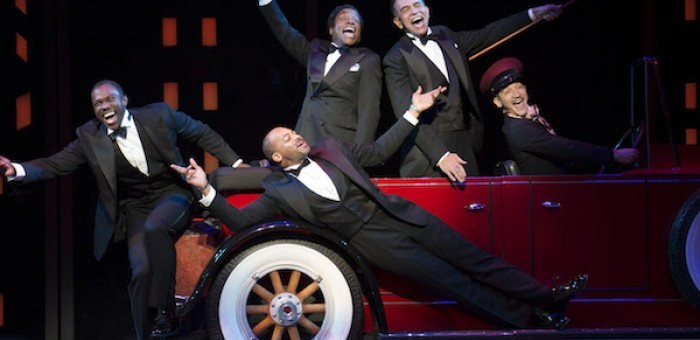Jan 13, 2026 2:09 PM
More Trump-Kennedy Center Cancellations
The fallout from the renaming of the John F. Kennedy Center for the Performing Arts to include President Donald…

Joshua Henry, Brandon Victor Dixon, Billy Porter and Brian Stokes Mitchell, with Richard Riaz Yoder, in a scene from Shuffle Along.
(Photo: Julieta Cervantes)Jazz history, for the most part, has not been made on the musical stage. But Broadway is madly tapping its feet these days to a glittering footnote in jazz history called Shuffle Along, which has settled into the Music Box Theater in New York for what could be an eon. The name belongs to the groundbreaking 1921 show by Eubie Blake and Noble Sissle that broke the monopoly of operettas and first brought jazz to American musical comedy.
When the original Shuffle Along came to Broadway, jazz was “trending,” as we might say now. It’s hard to know precisely what the word “jazz” might have meant then. It was still without a formal history or lucid identity—barely even a brand yet. The show’s main selling point then was that it was written and played “entirely by negroes” (sic), according to the original New York Times review.
It was something the American theater mecca had not seen for more than a decade. But few critics failed to note its new and distinct musical extract. “A breeze of super-jazz blown up from Dixie,” said the Evening Journal. “Full of jazz … the real thing,” noted the Evening World. And the Times pronounced it a “swinging score, “ one of the earliest applications of the word “swing” to describe jazz.
Enough of the original score was recorded at the time by Blake, Sissle, Aubrey Lyles and Flournoy Miller that in 1976 New World Records was able to assemble something close to an original cast album. You can hear what the world believed jazz was in 1921. By the time the show closed, people were beginning to think of the 1920s as the “Jazz Age.”
More importantly, its successful run of 504 performances cleared the path for a succession of black Broadway musicals that would not only expand our understanding of jazz but put such standards as “Runnin’ Wild,” “Ain’t Misbehavin’” “I Can’t Give You Anything But Love” and “I Must Have That Man” into the Great American Songbook.
The Shuffle Along of 1921 was a smoking-hot revue draped loosely around the story of a local mayoral election in the imaginary Southern burg of Jimtown.
While the show itself may have been forgotten soon enough, Blake’s mock campaign song for the show’s fictional hero, Harry Walton, lived on. A generation later, “I’m Just Wild About Harry” helped elect Harry Truman president. And songwriter Fred Rose slipped a homage to Shuffle Along into his 1925 jazz hit “Jimtown Blues,” a cultural reference mostly lost by the time kids were dancing to Fletcher Henderson and Tommy Dorsey’s crisp swing versions of the tune 20 years later.
The present Shuffle Along is not a revival of the original but a biography of it. Lest there be any doubt, a long and cautionary subtitle has been appended: Or The Making of the Musical Sensation of 1921 and All That Followed. The show’s original creators (Blake is portrayed by Brandon Victor Dixon; Joshua Henry plays Noble Sissle) become characters in the new version, struggling to get their idea produced.

Belá Fleck during an interview with Fredrika Whitfield on CNN.
Jan 13, 2026 2:09 PM
The fallout from the renaming of the John F. Kennedy Center for the Performing Arts to include President Donald…

Peplowski first came to prominence in legacy swing bands, including the final iteration of the Benny Goodman Orchestra, before beginning a solo career in the late 1980s.
Feb 3, 2026 12:10 AM
Ken Peplowski, a clarinetist and tenor saxophonist who straddled the worlds of traditional and modern jazz, died Feb. 2…

The success of Oregon’s first album, 1971’s Music Of Another Present Era, allowed Towner to establish a solo career.
Jan 19, 2026 5:02 PM
Ralph Towner, a guitarist and composer who blended multiple genres, including jazz — and throughout them all remained…

Rico’s Anti-Microbial Instrument Swab
Jan 19, 2026 2:48 PM
With this year’s NAMM Show right around the corner, we can look forward to plenty of new and innovative instruments…

Richie Beirach was particularly renowned for his approach to chromatic harmony, which he used to improvise reharmonizations of originals and standards.
Jan 27, 2026 11:19 AM
Richie Beirach, a pianist and composer who channeled a knowledge of modern classical music into his jazz practice,…